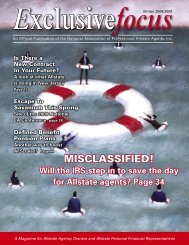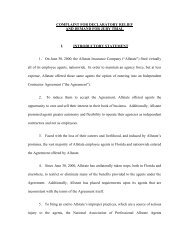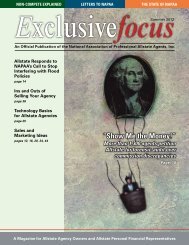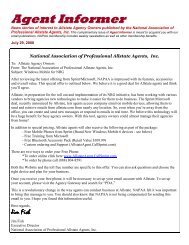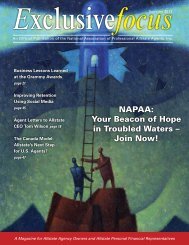EF summer 08.indd - National Association of Professional Allstate ...
EF summer 08.indd - National Association of Professional Allstate ...
EF summer 08.indd - National Association of Professional Allstate ...
Create successful ePaper yourself
Turn your PDF publications into a flip-book with our unique Google optimized e-Paper software.
thousands, <strong>of</strong> agents will have received<br />
letters advising them that they must<br />
make substantial improvements in AFS<br />
production. Many will fail. And agent<br />
morale will plummet once again.<br />
Based on its actions, it would seem<br />
that <strong>Allstate</strong> is smitten with a “what are<br />
you going to do for me today” mentality.<br />
Instead <strong>of</strong> taking a long-term approach<br />
like State Farm, company management<br />
appears to be focusing on an “instant gratification”<br />
philosophy. Dedicated, longterm<br />
agents who have built their agencies<br />
customer by customer are no longer<br />
revered because, in many cases, they don’t<br />
submit the volume <strong>of</strong> AFS business the<br />
company desires. The fact that these<br />
agents have spent 30 years or more nurturing<br />
customer relationships means little<br />
to today’s managers. Evidence <strong>of</strong> this pervasive<br />
mindset abounds. At a 2008 kick<strong>of</strong>f<br />
meeting in Tampa, Florida, MDL Betty<br />
Lauro insulted seasoned agents when she<br />
proudly proclaimed that more than 50%<br />
<strong>of</strong> the agents in the Bay area market had<br />
less than three years service. Is this a statistic<br />
to be proud <strong>of</strong> In most industries,<br />
even within our own, experience matters.<br />
When agents leave <strong>Allstate</strong> voluntarily,<br />
there are few acknowledgements<br />
or “thank yous” for their years <strong>of</strong> valued<br />
service. And after leaving the company,<br />
it’s as if you never existed. It wasn’t always<br />
that way. Back in the days before the 2000<br />
mass conversion, many regions honored<br />
agents with long tenures. Management<br />
acknowledged and respected those who<br />
had spent their careers on the front lines,<br />
building the <strong>Allstate</strong> brand. Retirement<br />
parties were commonplace and were <strong>of</strong>tentimes<br />
sponsored and paid for by the<br />
company. Today, such an event would be a<br />
very rare exception. Apparently the company<br />
has made a conscious decision to rid<br />
itself <strong>of</strong> its experienced agents so as to not<br />
taint the minds and attitudes <strong>of</strong> its new<br />
crop <strong>of</strong> agency owners.<br />
But the story does not end yet. Consider<br />
<strong>Allstate</strong>’s most recent cost shifting<br />
program: Agent Choice Technology<br />
(ACT). Agents now pay for: rent, electricity,<br />
phone service, advertising, yellow<br />
pages, letterhead and envelopes, MVR<br />
expense, employee expense, postage, and<br />
miscellaneous <strong>of</strong>fice expenses. When <strong>Allstate</strong><br />
completes ACT implementation, the<br />
only thing agents won’t pay for directly is<br />
after-hours service. Given this scenario,<br />
the question agency owners should be<br />
asking themselves is “What is <strong>Allstate</strong>’s<br />
value proposition for me” Not only will<br />
<strong>Allstate</strong> agents be paying for nearly all <strong>of</strong><br />
their own expenses while they earn a fraction<br />
<strong>of</strong> their independent agents counterparts,<br />
they are hounded for more AFS<br />
production. Then, when they don’t make<br />
their numbers, they are threatened with<br />
termination. Besides the potential resale<br />
value, say between 2 to 4 times renewals,<br />
<strong>of</strong> an agent’s book <strong>of</strong> business and the<br />
“privilege” <strong>of</strong> being able to represent the<br />
<strong>Allstate</strong> brand, there really is very little<br />
else the company <strong>of</strong>fers its agency force in<br />
terms <strong>of</strong> a value proposition.<br />
But is there a better way <strong>Allstate</strong> only<br />
With an apparent all-out<br />
assault on agency owners who<br />
haven’t met their AFS numbers<br />
in progress, it appears the<br />
company is growing<br />
desperate.<br />
has to look to its main competitor for the<br />
answer. State Farm, the perennial market<br />
leader, does more with less. Fewer agents,<br />
fewer managers, yet higher sales. It would<br />
make much more sense for the company to<br />
lop <strong>of</strong>f a few layers <strong>of</strong> management instead<br />
<strong>of</strong> firing agents. When asked about the<br />
value their MDLs bring to the table, most<br />
agents overwhelming agree that while they<br />
try hard, they are generally “useless.” By<br />
eliminating every IDL, MDL and most<br />
TDLs, <strong>Allstate</strong> could immediately add<br />
to their bottom line pr<strong>of</strong>itability. Salaries,<br />
benefits, 401ks, car allowance, and, <strong>of</strong><br />
course, bonuses for managers must total in<br />
the hundreds <strong>of</strong> millions annually.<br />
Giving up this bloated system, however,<br />
would loosen the company’s reins<br />
over its agents. Never mind that such a<br />
move, if implemented properly, could<br />
cause a positive paradigm shift for the<br />
company and the agency force, plus save<br />
millions <strong>of</strong> dollars a year. Would agents<br />
run amok The answer is no. The vast<br />
majority <strong>of</strong> agency owners are responsible<br />
business owners who understand full<br />
circle selling principles.<br />
<strong>Allstate</strong>’s pyramid management system<br />
has worked for decades. Is it still “working<br />
as designed” or are we beginning to see<br />
chinks in its armor With an apparent allout<br />
assault on agency owners who haven’t<br />
met their AFS numbers in progress, it appears<br />
the company is growing desperate.<br />
Competition continues to make serious<br />
inroads into <strong>Allstate</strong>’s vaunted market<br />
position. The company has responded by<br />
increasing Expected Results quotas while<br />
it announced a cut in life commissions – a<br />
move that is sure to motivate agents to sell<br />
more AFS products.<br />
In another attempt to increase the<br />
[ ]<br />
company’s eroding PIF base, it has announced<br />
“Emerging Businesses” pilot<br />
programs in a few states, including Florida,<br />
Texas, Colorado and Pennsylvania.<br />
The plan is to incentivize agents to sell<br />
Motorcycle, RV and Renters by paying<br />
first-year commissions as high as 30% on<br />
these products. As appetizing as this may<br />
sound, the devil is in the details because<br />
renewal commissions can be as low as 2%<br />
for the life <strong>of</strong> the policy. Hypothetically,<br />
an agent selling 1,000,000 <strong>of</strong> this business<br />
would earn a whopping $300,000<br />
in first-year commissions – not a bad return.<br />
The downside is that the renewal<br />
income generated from these policies<br />
only amounts to $20,000 a year, assuming<br />
a 2% commission rate.<br />
Based on these examples and those<br />
in Canada, it looks like the company has<br />
set its sights on lowering agent commissions.<br />
It has become more apparent, at<br />
least to this writer that, not only is the<br />
Summer 2008 Exclusivefocus — 29





